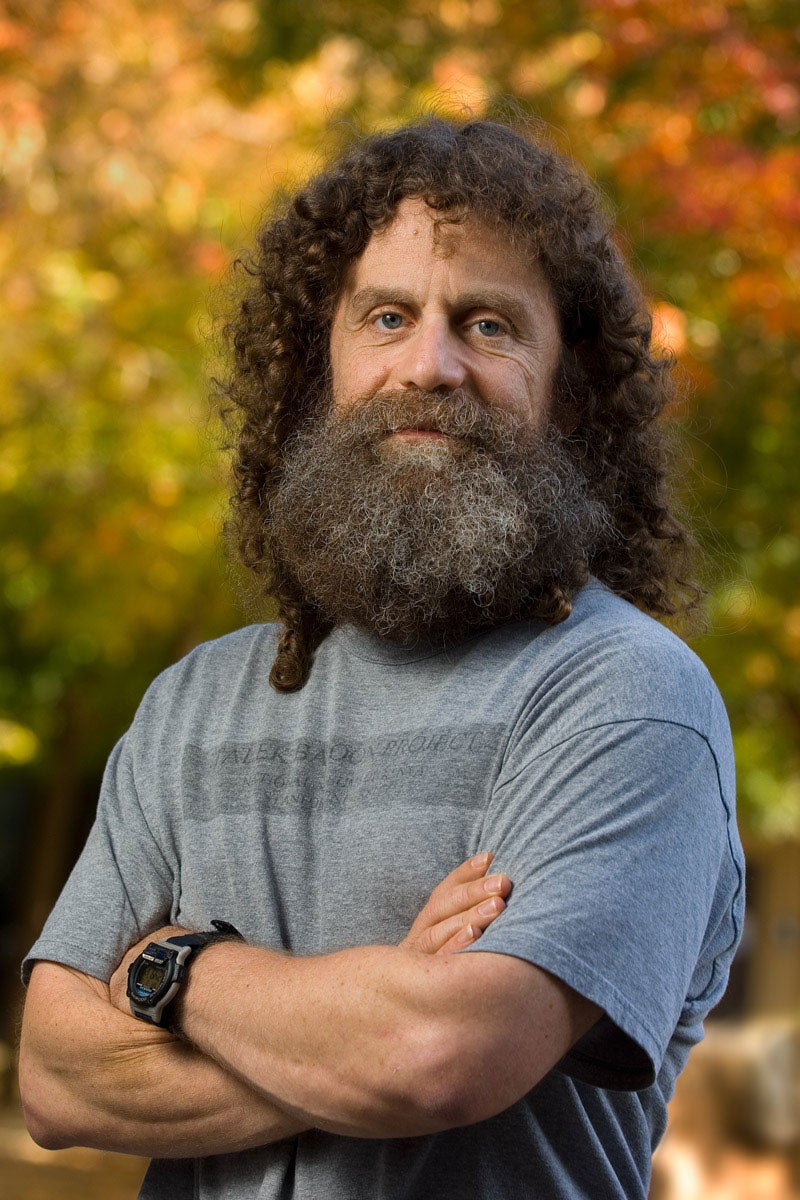Stanford biologist Robert Sapolsky ponders the best and worst of us, plus free will
With the publication of his latest book, Robert Sapolsky tackles the best and worst of human behavior and the nature of justice in the absence of free will.

Robert Sapolsky (Image credit: L.A. Cicero)
Robert Sapolsky is a lot of things: a MacArthur Fellow who spent years studying a troop of baboons in Kenya, a neuroendocrinologist who changed the way we think about stress and the brain, an accomplished columnist and writer of popular science books. He is also a professor of biology at Stanford who has long been interested in what animals can tell us about our own behavior.
Most recently, Sapolsky has been reflecting on the origins of human behavior, starting deep in the brain moments before we act and working his way millions of years back to the evolutionary pressures on our prehistoric ancestors’ decisions, with stops along the way to consider how hormones, brain development and social structures shape our behavior. He also has been thinking about free will and comes to the conclusion, based on the biological and psychological evidence, that we do not have it.
On the occasion of his latest book, Behave: The Biology of Humans at Our Best and Worst, Stanford News Service interviewed Sapolsky about science, the need to be “behavioral biologists” and what to do about justice if, as Sapolsky argues, we do not have free will.
You’ve advanced the idea that we can’t understand human behavior by studying it at just one level – that, for example, we can’t understand politics without studying neurons, brain chemistry without studying psychology, or perhaps even humans without studying apes. Does that mean that we’ve been studying behavior the wrong way? Are university departments too compartmentalized to see the forest for the trees?
Well, there’s nothing particularly special about the idea – scientists thinking about the bases of behavior know that you have to be multidisciplinary. There are entire journals that enshrine that concept, for example, Psychoneuroimmunology or Brain, Behavior and Evolution, and every university of note is overflowing with interdisciplinary programs.
Where the contrast comes in is with individual scientists’ research. Of necessity, a scientist typically studies one incredibly tiny sliver of some biological system, totally ensconced within one discipline, because even figuring out how one sliver works is really hard. There are not many scientists who would argue that their sliver is the only thing that should be studied – just that it’s the most important, which sure makes sense, if they just spent their last seven decades obsessing over that sliver.
Is that a problem?
It’s not a problem if all they do is talk and think about sliver X. But potentially a definite problem if they think larger and their sliver X-centric view of the universe is distorted.
All roads in human behavior seem to lead to “it’s complicated.” Out of the mess of things that combine to create our best and worst and typical behavior, what do you think is most important for ordinary people to know? What about policymakers or other scientists?
I think it’s the same for both groups, which is that we’re all behavioral biologists – when we serve on juries, when we vote for whether government funds should be spent to try to correct some societal ill, when we deal with an intimate with a mental illness, we are tacitly deciding how and how much our behavior is constrained by biology. So we might as well be informed behavioral biologists. And one thing that involves is being profoundly cautious and humble when it comes to deciding you understand the causes of a behavior, especially one that we judge harshly.
What does that suggest about judicial sentencing rules or the death penalty, for example?
Basically, that the criminal justice system is staggeringly out of date in incorporating neuroscience into its thinking. As one flagrant example, the gold standard for determining whether someone is so organically impaired that they can’t be held responsible for their criminal actions – the “M’Naghten rule” concerning an inability to tell the difference between right and wrong – is based on the case of a man by that name, almost certainly a paranoid schizophrenic, from the 1840s. The 1840s!
What are the most important questions that remain?
For me, the single most important question is how to construct a society that is just, safe, peaceful – all those good things – when people finally accept that there is no free will.
That’s a tall order, given that philosophers – let alone politicians and activists – have trouble deciding what justice and free will mean.
A tall order, indeed, because words like “justice,” “punishment,” “accountability” become completely irrelevant – as irrelevant as if a car that has damaged brakes and is dangerous to drive is thought to be accountable for being dangerous, and that justice is served when the car is punished by locking it up in a garage and not driven.
And it’s equally important and challenging to realize that free will is also irrelevant to our best as well as our worst behaviors. And thus where praising seems as irrelevant as praising a car for having a strong work ethic and admirable gratification postponement when it makes it up the top of a steep road. Or if you give a car preferential treatment if it was manufactured with a really attractive hood ornament.
Yes, a very tall order, and I’m not sure if it is achievable.
Sapolsky is also the John A. and Cynthia Fry Gunn Professor, a professor of neurology and neurological sciences and of neurosurgery, and a member of Stanford Bio-X and the Stanford Neurosciences Institute.
